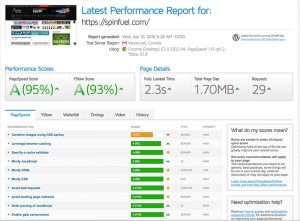Table of Contents
Last Updated on April 10, 2019 by Team Spinfuel
How to Sell Vape Gear Online, Part 2
Welcome back to my start-to-finish guide to selling vape gear online. (Part One is Here) If you want to build an online vape shop and don’t know where to begin, you’ve come to the right place. In the previous installment, we explored how to choose the perfect vaping domain name. Did you use the advice in that article to snag a great domain name for yourself? Do you want some web hosting advice? Are you having trouble with website speed or another issue? Drop me a line through eCig One. I love to talk shop. Now that you’ve got the perfect domain, it’s time to choose a web host – and that’s what we’re going to discuss today.

Choosing a web host for any online store isn’t easy; there are enormous differences between standard websites such as blogs and full-fledged online businesses. An online storefront needs a web host that’s extremely secure and can provide excellent page loading times even during periods of extremely high traffic. You also need a host that either provides a shopping cart platform and payment processing or can integrate with the payment processor of your choice. Competition among web hosts is intense, and that’s good for you. The competition means that a typical web host provides excellent service at a low price. That doesn’t mean, though, that you should simply select the first host you find. You also shouldn’t assume that a web host is better than the rest simply because it’s more expensive.
Let’s examine the things that you should consider before choosing a web host for your online vape shop.
Online Shoppers Expect Great Page Loading Speeds
In 2018, Google published a study about how mobile users behave when they encounter slow websites. Google discovered that when a page takes longer than three seconds to load, 53 percent of mobile users will abandon the page and go somewhere else. The slower your website is, the more likely it is that potential customers will give up and leave. Google knows that, and they use website loading times as a factor in their search rankings. Your web host absolutely must be fast. Here’s the thing about web host speeds, though.
You Can’t Rely on Web Host “Reviews”
If you don’t know where to begin when it comes to choosing a web host for your online vape shop, you might start by reading some reviews. Web hosting reviews are great for learning about the features and policies of various web hosts. They’re weak, though, when it comes to providing information about speed.
Unless you have a sizable budget, it’s likely that your online vape shop will initially be on a shared hosting plan. That means you’ll be sharing server resources with other customers. To make a shared hosting service profitable, the host needs to place as many customers on each server as possible. Until your website actually goes live, there’s no way to predict what your experience will be like. Will you be placed on a server that’s been a bit oversold? Will you end up on the same server with a popular website that sucks away the resources you need?
You can’t put too much stock in a web hosting review because you could be placed on a different server and have an entirely different experience. It’s important, therefore, to choose a host with a money-back guarantee. If you’re not happy, you should be able to cancel your account, get your money back and try a different hosting company.
 You Can’t Fix the Time to First Byte
You Can’t Fix the Time to First Byte
After you activate your hosting account, one of the first things you’ll want to do is build a working website and see what your page loading times are like. The easiest way to do that is by installing WordPress and filling your site with dummy content. FakerPress is a WordPress plugin that can generate dummy content automatically. Next, you’ll want to run some speed tests. Here are a few popular website speed tests:
- Google PageSpeed Insights
- GTmetrix
- Pingdom
All three speed tests (check out the GTMetrix Score For Spinfuel VAPE for an idea on just how fast your site should be) will provide advice regarding what you can do to improve your website’s loading times. You can ignore most of those tips for right now because you’re not developing your real website yet; you’re simply testing what your web server’s response time would be like in a real-world scenario. You should pay attention, however, to two key metrics.
- What is the time to first byte?
- What is the total page load time? Is it three seconds or less?
The time to first byte measures the time required for a web browser to receive the first byte of data from the remote server. When you’re running a speed test like the three linked to above, TTFB can give you a good idea of the web host’s database responsiveness, network efficiency, server performance and firewall speed. If your website serves content dynamically from a database – as almost all modern websites do – there is virtually nothing that you can do to improve the TTFB. If the TTFB is over three seconds, you’ll never have a website that meets Google’s standards for fast mobile sites unless something changes in the hosting environment.
What Features Should a Fast Web Host Have?
Every web hosting company knows that loading times are important to website owners, website users and Google. Every web host, therefore, will tell you that its page loading speeds are the best. It’s wise to ignore the marketing language and look instead for specific features that ensure top-notch performance.
- Solid-state storagedramatically improves a server’s random-access times, greatly enhancing database performance.
- High-performance hardwaresuch as a fast processor and plenty of memory helps a server handle a greater number of shared hosting customers without slowing down during periods of high demand.
- Physical proximity reduces network latency and helps to ensure that your customers will experience quick response times. Choose a web host with a data center as close as possible to where your customers are.
- Server caching and load-balancing softwaresuch as Squid and Varnish increase server efficiency by managing resource-intensive database queries.
If you’re unhappy about your website’s speed, the time to complain is when you’re still in your host’s free trial period. Once the trial expires, the host’s technical support staff is less likely to take your issue seriously.
A Web Host Should Offer Top-Notch Security
When you own a website, much of that site’s security is your responsibility. If someone manages to hack your email and gain access to your online vape shop through the password recovery process, for example, that’s not your host’s fault. If you want to sell vape gear online, you’ll need to take some time to learn about the best security practices and ensure that you’ve taken the appropriate measures. As I mentioned in the previous article, hackers aren’t going after big businesses like IBM. They’re going after small business owners like you. You can, however, expect a bit of help from your web host in certain areas because intrusion prevention protects all of the host’s customers.
Automatic Backups Give You Peace of Mind
Hackers infiltrate some 30,000 websites per day and force those sites to become unwitting distributors of malware. What would you do if someone gained access to your online vape shop and planted malware or defaced your content? Would you have any idea how to recover your site? If the answer is “no,” you need to choose a web host that offers automatic backup and restoration of your site’s files and databases. In many cases, site backups are included in the basic fee that you pay for hosting. Before you assume that your host’s free automatic backups are all that you need, though, read the terms carefully.
- Backups may not be guaranteed; they may only be offered on a “best effort” basis.
- The host may charge a fee to restore a backup.
- The host’s automatic backups may not work under certain conditions or with certain content management systems.
Your host may offer fee-based backups with more ironclad terms. Alternatively, you could use a third-party backup service such as VaultPress from Automattic, the maker of WordPress.
DDoS Mitigation Helps Your Site Stay Online
In a distributed denial-of-service attack, a malicious party attempts to bring down a website by flooding it with unwanted requests from compromised Internet-connected devices around the world. Although no web host can guarantee that your website would remain online during a DDoS attack, a good host should at least have the ability to detect and mitigate such an attack.
Two-Factor Authentication Protects You From Password Theft
When you create an account with a web host, you’ll be given a user name and password just like the login credentials that you use for other websites. The difference between your web host and other sites, though, is that the password for your web host is the key to your entire business. Anyone with that password can access and change absolutely anything about your website – unless you use two-factor authentication. With two-factor authentication, the host will send a one-time password to your phone when someone attempts to log in to your account. It’ll only be possible to log in with knowledge of your password and physical access to your phone. It’s very wise to choose a host that offers two-factor authentication.
Other Security Features a Web Host May Offer
Before committing to a web host, explore their website and learn about what they do to protect their network and mitigate threats. Some of the security features that a host may offer include:
- Scanning for and blocking automated access attempts
- Automatic malware scanning
- Automatic updates for the server kernel and software
- Hardware and/or software firewalls
- Real-time server process monitoring
- Restricted physical access to servers
What Type of Web Host Is Best for an Online Vape Shop?
When you look for the best hosting solution for your online vape shop, you’ll see three types of hosting that differ greatly in their prices and what they offer. Those three types are shared, VPSand dedicatedhosting. If you’re not sure what you need, it’s likely that shared hosting is the best option for you; shared hosting offers sufficient performance for a site that receives up to a few thousand or so daily visitors. If your ambitions are even greater than that, though, it might be worthwhile to choose a different hosting option. Here’s how they differ.
For a powerful network server, serving a few images and blog posts to users requires almost no computational power. It makes sense, then, for a web host to allow many small websites to reside on a single server. Sharing a server’s resources allows customers to pay low monthly prices while still enjoying adequate performance. Shared hosting plans often start at well under $10 per month.
Don’t assume that shared hosting will be slow simply because it’s inexpensive. My website eCig One is on a shared hosting plan and loads in about 1.4 seconds. The risk with shared hosting, though, is that there’s always a chance of ending up on a congested server that the hosting company has oversold. There’s also a chance that malware or high traffic on another site could harm your site’s performance. That’s why it’s wise to choose a hosting company with a money-back guarantee.
VPS Hosting Dedicates Part of a Server to You
You can think of Virtual Private Server (VPS) hosting as the halfway point between shared hosting and dedicated hosting. You’re still sharing a server’s resources, but the hosting company guarantees that a percentage of the server’s resources will always be available to you for the duration of your contract. Let’s suppose, for example, that a server has the following specifications.
- 4 GHz Processor
- 32 GB RAM
- 512 GB SSD
- 10 Gbit/sec Network Connection
The hosting company could segment that physical server into four virtual servers, each with a 1 GHz processor, 8 GB RAM, 128 GB of solid-state storage and a 2.5 Gbit/sec network connection. Those resources are yours, and no other customer can utilize them.
VPS hosting typically starts at around $50 per month. In addition to the fact that the resources of the VPS belong entirely to you, another benefit of VPS hosting is that it’s easy to purchase additional server resources if the plan that you purchase turns out not to be fast enough. In addition, you can run a custom application in a VPS environment. That’s not possible with a shared hosting plan.
A drawback of VPS hosting is that you may not actually find it faster than a shared hosting plan. A website in a shared hosting environment may experience poor performance if other sites on the same server experience heavy demand. If your website is on a shared server with resources to spare, though, you may never experience those periods of poor performance. In that case, the performance of a VPS environment might be about the same.
Dedicated Hosting Gives You the Server’s Full Resources
Dedicated hosting typically starts at around $150-200 per month, and it gives you full access to the resources of a physical server. Dedicated hosting is typically the fastest option that any hosting provider offers. It’s also the best hosting option if you want to develop your online vape shop from scratch; with a dedicated server, you can build absolutely anything. On the other hand, it’s unlikely that you truly require the resources of a dedicated server unless your website receives many thousands of visitors every day.
With a standard dedicated hosting environment, you won’t get the friendly graphical front end that you get with a shared hosting environment. You’ll need to be comfortable working with a command line. You can alternatively choose a managed dedicated hosting environment. In that case, you’ll get the graphical front end, and the hosting company will manage the server for you. With a managed dedicated server, though, you can’t use custom applications.
Additional Hosting Features to Consider for an Online Vape Shop
At this point, you should have a pretty good idea of the features that a web host for an online vape shop must have. I’ll conclude the article by discussing two additional things that you should add to your shopping cart before closing the deal on your hosting contract. I’ll also talk about one additional wrinkle that could affect your hosting decision.
A Dedicated IP Address Shields You From Others’ Misdeeds
By default, your hosting provider will use a configuration in which your website shares an IP address with many other websites. While a shared IP address configuration works fine for most websites, it’s better for your online vape shop to have a dedicated IP address. A dedicated IP will add around $4 to your monthly hosting bill, but it’s a worthwhile expense because it helps to ensure that you’ll never have trouble with email deliverability. If your website uses a shared IP address – and someone else using the same IP address begins sending spam email – there’s a chance that an email blacklist provider could block the IP address. If that happens, you’ll have difficulty getting your messages to their intended recipients. If you have a dedicated IP address, you won’t have to worry about email deliverability.
An SSL Certificate Is Necessary for Any E-Commerce Website
Running an online vape shop means that customers will be able to create accounts on your site. Your site’s database will contain personal information such as names, addresses and birth dates. Customers will also transmit credit card numbers through your site when purchasing products. An SSL certificate makes it possible to encrypt information traveling to and from your web server, eliminating the possibility that a malicious third party could intercept and read that information.
It’s absolutely essential for any e-commerce website to have an SSL certificate. Without one, your online vape shop will have poor rankings on Google. Potential customers who visit your site will also see a prominent “Not Secure” warning in the Google Chrome web browser. Many web hosts provide SSL certificates for free. You’ll want to install your certificate before building your site.
A Built-In Shopping Cart Is Perfect for a New Store Owner
In the next installment in this series, I’ll discuss some of the options available for helping you get your online vape shop built quickly. That article will focus on the need for a shopping cart platform. For now, though, I’ll simply say that it’s wise to consider working with a web host that can integrate shopping cart software with your website automatically.
The Shopify platform is one option; Shopify is a hosting company that makes it very easy to build e-commerce sites. Shopify even processes payments. Unfortunately, though, Shopify does not process payments for vaping products. If you use Shopify, you’ll need to integrate your Shopify store with a third-party payment processor. You’ll pay transaction fees to Shopify – even though they aren’t processing the payments – in addition to the fees that the payment processor requires.
Looking for a lower-cost option? No problem. In the next installment, you’ll learn more about the many ways in which you can build a thriving online vape shop without spending a lot of money. Check back for that article soon. In the meantime, keep in touch!








